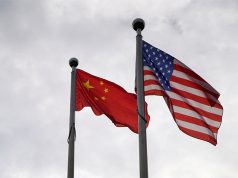The national government’s quick response against the depiction of China’s illegal nine-dash line map on Netflix‘s “Pine Gap” series drew mixed reactions online.
On Monday evening, the streaming giant pulled out the second and third episodes of the fictional spy drama as they featured the invalidated territory.
Some Filipinos cheered the Movie and Television Review and Classification Board for its decision to make this order on the streaming service provider.
Others were worried about the possible implications of this move, perceived as a form of “censorship.”
In a statement on Tuesday, the Department of Foreign Affairs said that its agency lodged a complaint against the Netflix show on September 28.
This then prompted the MTRCB to issue an order to take down the episodes, where the nine-dash line map was shown, for “violating Philippine sovereignty.”
READ: Philippines asks Netflix to remove spy drama episodes over Chinese map
“After a thorough review, the Board ruled that certain episodes of ‘Pine Gap’ are ‘unfit for public exhibition.’ The MTRCB also ordered the immediate pull-out of relevant episodes by its provider, Netflix Inc., from its video streaming platform,” the DFA said.
According to the DFA, the board described the portrayal of China’s claim over the West Philippine Sea as “a crafty attempt” to memorialize the nine-dash line despite being invalidated by international law.
“Such portrayal is a crafty attempt to perpetuate and memorialize in the consciousness of the present generation of viewers and the generations to come the illegal nine-dash line. Using the medium of a motion picture is but China’s unconventional approach to gain an upper hand in the territorial conflict in the South China Sea/West Philippine Sea,” the DFA said.
Vietnam also previously filed a similar complaint before Netflix, prompting the removal “Pine Gap” from its platform in the country.
READ: Netflix removes spy drama episodes after Philippines’ complaint over China map
Approval and concerns
Following Netflix’s action, some Filipino online users cheered MTRCB and DFA for standing up for the country’s sovereignty.
“The act of banning and removing anything that presents the ‘nine dash line’ is an act of protest against China’s modern imperialism,” one Twitter user said.
Others hoped that the government’s protests against China would also go beyond fictional programs.
“Sana yung concern from the reel tumawid sa real world,” one user tweeted.
“Sana ‘di lang sa Netflix dine-defend ang Philippine sovereignty,” another user Twitter wrote.
Some lawyers, on the other hand, raised concerns over the implications of the government’s move to “censor” digital content.
“The Netflix action on ‘Pine Gap,’ while morally satisfying, is IMO (In my opinion) dangerous. The show is a work of fiction and not a documentary; the misleading portion on the 9-dash line could have been addressed by adding a mandatory explanation appearing on screen during those scenes,” said former Supreme Court spokesperson Theodore Te.
“Setting aside qualms about censorship, requiring that the map be blurred, rather than pulling out the episodes, appears to me to better satisfy the test of proportionality when it comes to possibly necessary infringements of free expression,” another lawyer with the handle @ohlistic said.
Not the first time
In 2019, the MTRCB banned a Dreamworks animated film called “Abominable” after the nine-dash line map was briefly featured on one of its scenes.
Aside from the Philippines, Vietnam and Malaysia also pulled out the screening of the movie in their respective theaters.
READ: 9-dash line spotted on TV, cinema. Is China trying to change the world’s mind?
The nine-dash line, which comprises nine dash marks, marked an expansive area of the South China Sea that China claims it has historical jurisdiction over.
However, in a landmark ruling in July 2016, the Permanent Court of Arbitration in The Hague, Netherlands invalidated this claim as baseless.










